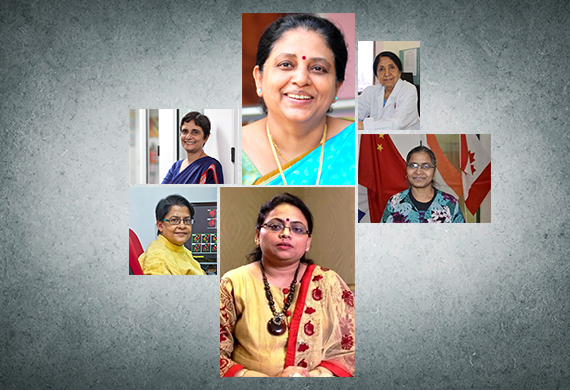
Six Contemporary Indian Women Expanding the Boundaries of Science and Technology
By: WE Staff
From being a minority, women in science today hold the most prominent positions in fields once thought to be unreachable. Today, India is home to a large number of outstanding women who have revolutionized science and technology. Women scientists have left their names in history on everything from vaccines to outer space. Like much of the rest of the globe, science and technology continue to be dominated by men in India. Ritu Karidhal, Chandrima Saha, and other women, on the other hand, have tasked with overseeing positions in organisations like ISRO and INSA and started new programmes that have had significant effects. India has a rich pool of talented women who have contributed to the progress of science and technology, paving the way for others to follow. Here is a list of women whose scientific endeavours have expanded the horizons of science on Earth and beyond.
Tessy Thomas
The "Missile Woman" of India, Tessy Thomas, is the Director-General of Aeronautical Systems and the former Project Director for the Agni-IV missile at the Defense Research and Development Organization Organization (DRDO). She is the first ever Indian woman scientist to lead a missile programme and holds a doctorate in missile guidance. She started working with DRDO in 1988 and has helped with mission planning, trajectory simulation, and guiding. The guiding method for long-range missile systems, which is utilised in all Agni missiles, was created by Thomas, a professional with over three decades of work experience. She has received numerous scholarships and honorary doctorates in addition to the DRDO Agni Award for Excellence in Self-Reliance, which was given to her in 2001.
Indira Hinduja
Indira was the first doctor to deliver a test tube baby in India in 1986. She is an Indian gynaecologist, obstetrician, and infertility expert who practises in Mumbai currently. She invented the gamete intrafallopian transfer technique (GIFT), which led to the delivery of the first GIFT child in India. She is also renowned for developing the country's first baby using the oocyte donation technique for menopausal and premature ovarian failure patients. She holds a PhD from the University of Bombay. She works as an obstetrician and gynaecologist full-time at the PD Hinduja Hospital in Mumbai. At the moment, Hinduja serves as an honorary gynaecologist and obstetrician at the PD Hinduja National Hospital and Medical Research Center in Mumbai.
Mangala Mani
Mangala Mani, known as the "polar woman of ISRO," was the organization's first female scientist to stay in Antarctica for more than a year. She was a member of the 23-person team that embarked on an expedition to Bharati, India's research station in Antarctica, in November 2016. She ran and maintained the ISRO ground station for 403 days while she was there. In the all-male team, she was the lone female. She was chosen to be a featured participant in the BBC's "100 Women Challenge" series on women in science.
Currently, Mangala Mani works at the National Remote Sensing Centre in Shadnagar, Hyderabad. Through data gathered from satellites, she continues to develop concepts while monitoring and managing the resources to enable disaster assistance systems.
Dr. Ritu Karidhal
Dr. Ritu Karidhal Srivastava is an Indian scientist who is employed by the Indian Space Research Organization (ISRO). The "Rocket Woman of India," as she is known, Ritu Karidhal was the Chandrayaan-2 mission's mission director, and she received accolades for leading one of India's most ambitious lunar projects. She was in charge of planning and carrying out the craft's onward autonomy system, which performed the satellite's activities independently in space and appropriately handled faults. Ritu, an aerospace engineer, joined ISRO in 2007 and served as the Mangalyaan Mars Orbiter mission's deputy operations director. She graduated from the University of Lucknow with a BSC in physics and from the Indian Institute of Science in Bengaluru with an MTech in aerospace engineering.
Gagandeep Kang
Gagandeep Kang, an Indian microbiologist and virologist, is the first woman from the country to be elected as a Fellow of the Royal Society. She is sometimes referred to as the "vaccine godmother" of India. She was a key contributor to the creation of Rotavac, a vaccine for diarrhoea from Bharat Biotech International. Kang has served as an ex-officio member of the COVID-19 vaccine working group formed by the WHO's Strategic Advisory Group of Experts since 2020. Currently, she oversees the Gastrointestinal Sciences Department at the Christian Medical College in Vellore, Tamil Nadu.
She served as the executive director of the Translational Health Science and Technology Institute in Faridabad, an independent institute within the Department of Biotechnology of the Ministry of Science and Technology of the Government of India, from August 2016 until July 2020. She is a renowned researcher who has focused much of her work on rotavirus vaccine testing and viral illnesses in young children. She also focuses on sanitation and water safety, other enteric illnesses, and the effects of early childhood infection on children.
Chandrima Shaha
Chandrima Shaha is a biologist from India who serves as the Indian National Science Academy's president and a distinguished chair professor at the Indian Institute of Chemical Biology in Kolkata. Chandrima is the Indian National Science Academy's first-ever female president (INSA). Before she assumed office on January 1, 2020, the Academy has never had a female president in its 85-year history. Over 80 research publications have been written by Chandrima, a cell biology expert who has extensively studied the "Leishmania" parasite that causes Kala Azar. She joined INSA in 2008 and held the position of vice president from 2016 to 2018. The Shakuntala Amirchand Award of the ICMR (1992) and the Special Award for the 50th Anniversary of DNA Double Helix Discovery (2003) for "significant contributions towards understanding of Cell Death Processes in different Model Organisms" are the awards Saha is most famous for among the many that she has received.


.jpg)



